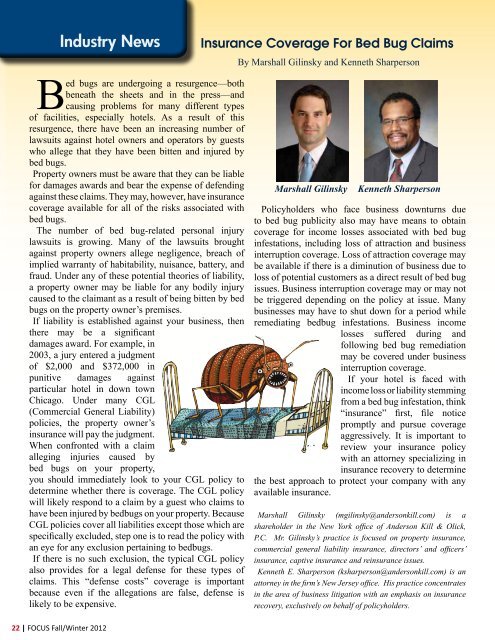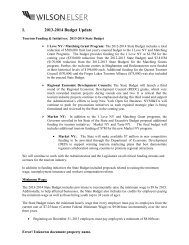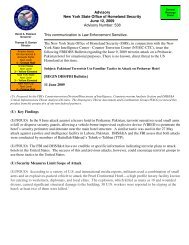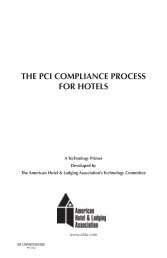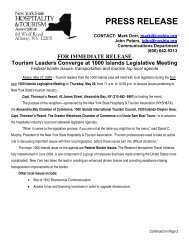2012 - New York State Hospitality & Tourism Association
2012 - New York State Hospitality & Tourism Association
2012 - New York State Hospitality & Tourism Association
Create successful ePaper yourself
Turn your PDF publications into a flip-book with our unique Google optimized e-Paper software.
Industry <strong>New</strong>s<br />
Insurance Coverage For Bed Bug Claims<br />
By Marshall Gilinsky and Kenneth Sharperson<br />
Bed bugs are undergoing a resurgence—both<br />
beneath the sheets and in the press—and<br />
causing problems for many different types<br />
of facilities, especially hotels. As a result of this<br />
resurgence, there have been an increasing number of<br />
lawsuits against hotel owners and operators by guests<br />
who allege that they have been bitten and injured by<br />
bed bugs.<br />
Property owners must be aware that they can be liable<br />
for damages awards and bear the expense of defending<br />
against these claims. They may, however, have insurance<br />
coverage available for all of the risks associated with<br />
bed bugs.<br />
The number of bed bug-related personal injury<br />
lawsuits is growing. Many of the lawsuits brought<br />
against property owners allege negligence, breach of<br />
implied warranty of habitability, nuisance, battery, and<br />
fraud. Under any of these potential theories of liability,<br />
a property owner may be liable for any bodily injury<br />
caused to the claimant as a result of being bitten by bed<br />
bugs on the property owner’s premises.<br />
If liability is established against your business, then<br />
there may be a significant<br />
damages award. For example, in<br />
2003, a jury entered a judgment<br />
of $2,000 and $372,000 in<br />
punitive damages against<br />
particular hotel in down town<br />
Chicago. Under many CGL<br />
(Commercial General Liability)<br />
policies, the property owner’s<br />
insurance will pay the judgment.<br />
When confronted with a claim<br />
alleging injuries caused by<br />
bed bugs on your property,<br />
you should immediately look to your CGL policy to<br />
determine whether there is coverage. The CGL policy<br />
will likely respond to a claim by a guest who claims to<br />
have been injured by bedbugs on your property. Because<br />
CGL policies cover all liabilities except those which are<br />
specifically excluded, step one is to read the policy with<br />
an eye for any exclusion pertaining to bedbugs.<br />
If there is no such exclusion, the typical CGL policy<br />
also provides for a legal defense for these types of<br />
claims. This “defense costs” coverage is important<br />
because even if the allegations are false, defense is<br />
likely to be expensive.<br />
Marshall Gilinsky<br />
Kenneth Sharperson<br />
Policyholders who face business downturns due<br />
to bed bug publicity also may have means to obtain<br />
coverage for income losses associated with bed bug<br />
infestations, including loss of attraction and business<br />
interruption coverage. Loss of attraction coverage may<br />
be available if there is a diminution of business due to<br />
loss of potential customers as a direct result of bed bug<br />
issues. Business interruption coverage may or may not<br />
be triggered depending on the policy at issue. Many<br />
businesses may have to shut down for a period while<br />
remediating bedbug infestations. Business income<br />
losses suffered during and<br />
following bed bug remediation<br />
may be covered under business<br />
interruption coverage.<br />
If your hotel is faced with<br />
income loss or liability stemming<br />
from a bed bug infestation, think<br />
“insurance” first, file notice<br />
promptly and pursue coverage<br />
aggressively. It is important to<br />
review your insurance policy<br />
with an attorney specializing in<br />
insurance recovery to determine<br />
the best approach to protect your company with any<br />
available insurance.<br />
Marshall Gilinsky (mgilinsky@andersonkill.com) is a<br />
shareholder in the <strong>New</strong> <strong>York</strong> office of Anderson Kill & Olick,<br />
P.C. Mr. Gilinsky’s practice is focused on property insurance,<br />
commercial general liability insurance, directors’ and officers’<br />
insurance, captive insurance and reinsurance issues.<br />
Kenneth E. Sharperson (ksharperson@andersonkill.com) is an<br />
attorney in the firm’s <strong>New</strong> Jersey office. His practice concentrates<br />
in the area of business litigation with an emphasis on insurance<br />
recovery, exclusively on behalf of policyholders.<br />
22 | FOCUS Fall/Winter <strong>2012</strong>


